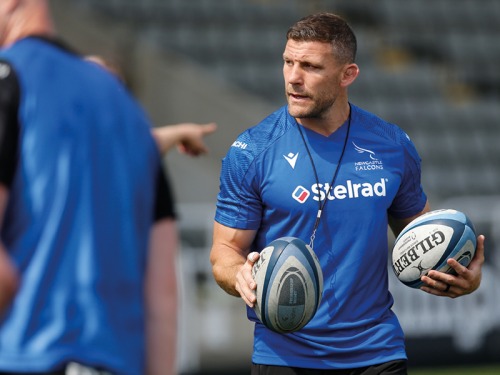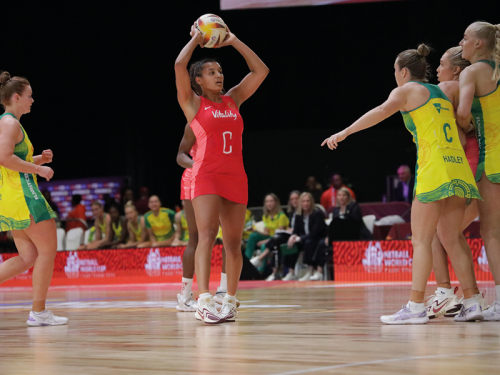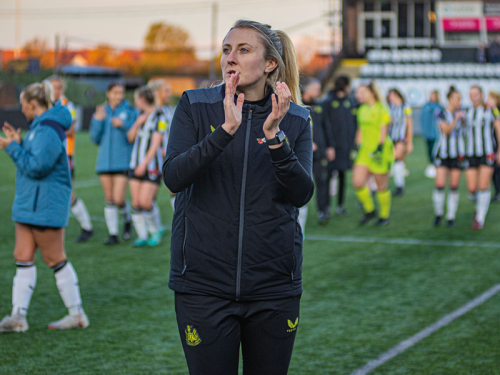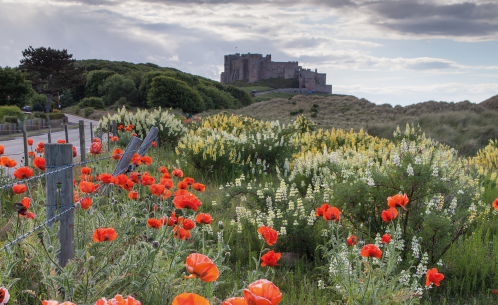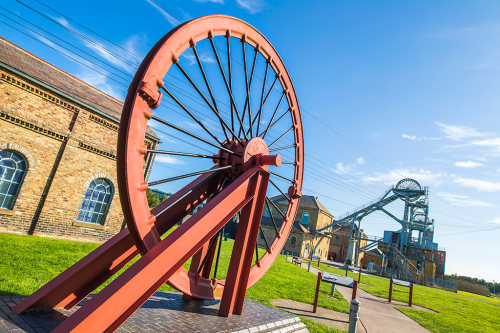Meet BBC Football Correspondent John Murray
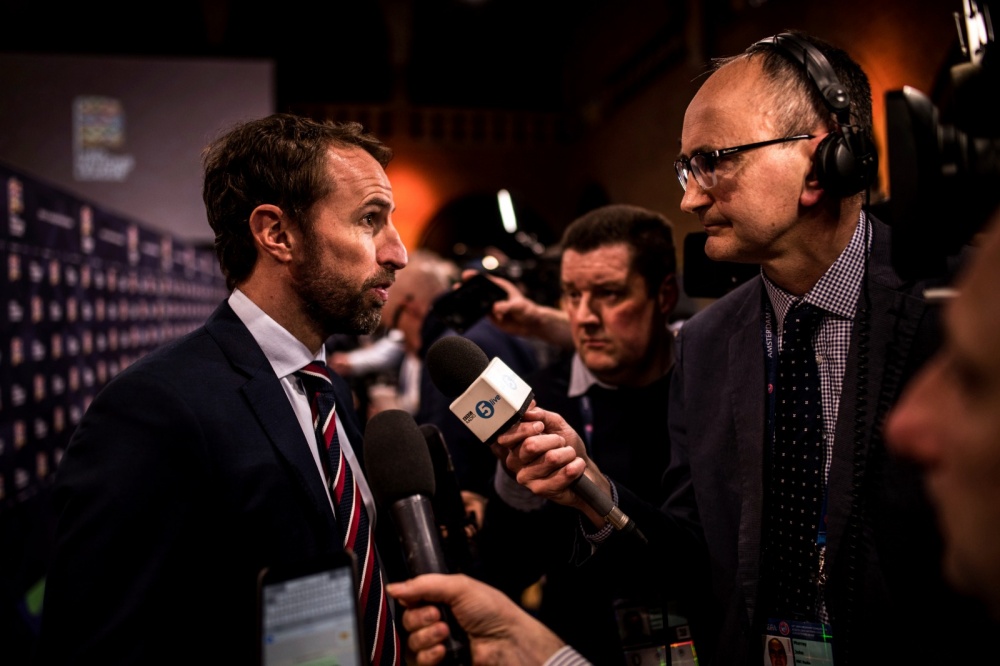
Born and raised on a farm among some of the most remote acres of Northumberland, the BBC's Football Correspondent waxes lyrical about growing up in the North East.
As I reflect on what was a thoroughly uplifting conversation, I decide to turn the radio on and catch up on what’s going on in the world on Radio 5 Live. It’s an unusual day on which the BBC is not just reporting the news, but is the news. After a shocking 25 years, it appears that much of the truth has been uncovered concerning the now widely-discredited journalist Martin Bashir and his historic interview with Princess Diana, the deceptive way in which the Panorama programme came about, and, more tellingly, how Princess Diana’s somewhat vulnerable persona was clearly taken advantage of. What’s worse, was the lamentable way that the BBC then looked into the events which led to the interview, with nothing being done. As Prince William tellingly said: ‘the tough questions simply weren’t asked’. This story will likely run and run, and so it should.
That said, to tarnish all the exceptional work that the BBC does on the back of this would be foolhardy, and for ample evidence of this it’s well worth taking time to consider the extraordinary career of John Murray, for not only does he talk an awful lot of sense, his journey to the very top surely shows that with hard work, dedication, ability and, yes, a bit of luck too, you really can turn your dream into a reality. For many football fans, the ultimate dream is to be the best player, or perhaps coach. But just imagine how amazing an alternative it would be to be the match commentator, witnessing some of sport’s greatest moments.
On the last weekend of another compelling Premier League season the BBC team showed this to exceptional effect as one of the strangest but most compelling Premier League seasons came to a close. Flitting between games as the results ebbed and flowed, the listener, whether they were a fan or not, could understand both the thrills and implications as each goal, or missed goal, changed the outcome of the whole season for the clubs involved, and of course their millions of supporters too. If you want to hear the BBC at its best, this was a terrific example, and at its heart was John Murray commentating from Anfield.
From the roar of the Kop as Liverpool secure European football, let’s journey back to the peace of a Northern farm on Hadrian’s Wall some 40 years previously, where the story started, as they often do, in the most unlikely of circumstances. One of four brothers, and with a father who was one of nine children, the Murrays have a footprint that is well established in these parts, with farming embedded in the family lineage. So, my fairly obvious first question was, what took the young Murray from these rather remote Northern slopes to the hotbed of international sport? He explains succinctly, and in that measured but engaging tone you hear on the radio: ‘There were two things that were big in my life growing up, farming and sport. They were the absolute twin pillars of my family, and not just my immediate family but most of the agricultural community in which we lived. My father played football locally and my brothers played rugby at Tynedale. I played football, and my nephews still play so we go back a long way. I played a lot of cricket too, which I absolutely loved. My friends at school all loved sport and the North East really is a sports mad part of the country, so that’s where it came from.’
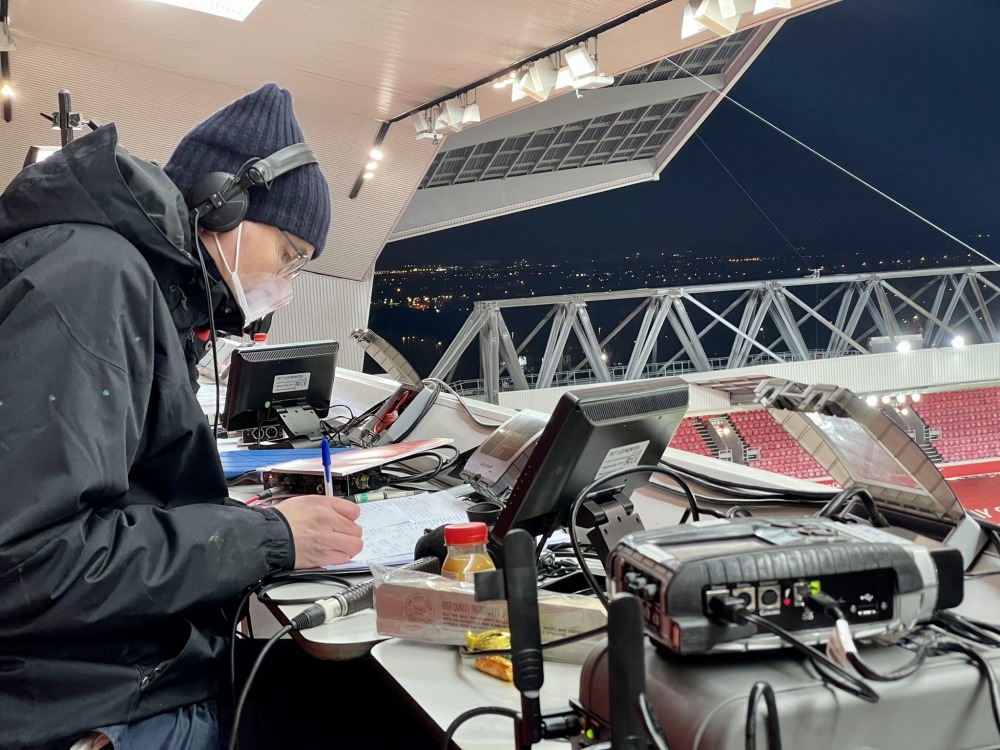
Those were the days when the BBC was in its prime. Pre-Sky and the various other broadcasters, it was setting the standard as well as providing the service of keeping the mad-keen public informed. It was this that first resonated with Murray, not as a would-be commentator but as an out-and-out fan. ‘My first sporting memory I would say was watching the Cup Final in the early ‘70s. I do remember us sitting down and watching the Sunderland v Leeds Cup Final, and next year the Newcastle v Liverpool Final.’ He then brings the conversation bang up to date with an important sporting truism. ‘Many of my colleagues today were taken with the real novelty value of live football, and the excitement surrounding the FA Cup and the big international tournaments like the World Cup was huge. Those were events that really captured my imagination. Listening to those matches on the radio, particularly the overseas matches, sewed the initial seed and really led to what I do now. But I can’t believe the position I am in now. Honestly, if you told me then what I was going to do I wouldn’t have believed you, I couldn’t have thought it possible.’
Murray is humble about his achievements. I remind him of the footsteps in which he now treads but once again can’t resist the obvious question: who was it that initially inspired him? ‘I would definitely say Peter Jones. I remember me and my school friends imitating his famous voice in the school yard at Haydon Bridge. I can still remember that now. If you listen to his commentary today you’ll realise that it really stands the test of time. He was a brilliant broadcaster, and he could absolutely nail it. The tone of his voice and the words that he used were outstanding, and with Bryon Butler they made an exceptional combination.
‘Even now, generations on in the sports department at the BBC, they are still held in the highest esteem. From a TV point of view, Barry Davies, John Motson, and Brian Moore were absolute staples and for me, as well the Test Match Special team who I have listened to all my life – they’ve been quite an influence too.’
As we reminisce about many hours spent listening to one of the great sporting institutions, and just how much Test Match Special means to so many people, I also learn about one of John Murray’s most important Test Match Special memories, ironically one which never played out on the radio, but helped to change this would-be commentator’s life. ‘When we talk about massive influences, Christopher Martin-Jenkins was hugely influential and he reminds me that I benefitted from a fair bit of good fortune,’ says John. ‘I went to watch a Test Match at Headingley. Coincidentally I was staying at the same bed and breakfast as one of the production assistants for TMS and we got talking at breakfast time. She said, “well, if I can I’ll try and see if you can come into the commentary box,” and she did, and in between commentaries Christopher Martin-Jenkins came out to speak to me and we had a good chat for about 20 minutes. It was such a positive influence on me. As a young lad who had ideas of getting into sports journalism, it meant so much that such a person could take time out to be so helpful and constructive.’
A couple of lessons here I guess. Firstly, always take your opportunities if they come your way – even over the breakfast table – and secondly (and just as importantly) if you can help enthusiastic youngsters on the way up, just 20 minutes might change their life. Now at the top of the tree, as you might imagine, John is always happy to talk with similarly enthusiastic youngsters. The key requirement that he feels is needed to succeed is genuine enthusiasm, and as he says the rewards are real and the satisfaction immense. There are sacrifices, often including not being able to actually play sport yourself, and friends and family (although not the farmers) are often off at weekends, and you are working, so it’s a big lifestyle choice.
The summer of sport which lies ahead is fantastic, a vintage year you might say, even with the many problems brought about by Covid-19. Covid has condensed the calendar in many ways – combining two years into one. The Euros is one such example. ‘We had all sorts of exciting journeys planned last year and some plans are still in place to travel, but I have serious doubts as to whether they will all go ahead,’ says John. ‘But we will be inside Wembley Stadium, so that’s a big plus.’
For the Olympics the plan was to be in Japan, covering the ceremonies and the Olympic football for Great Britain. The plan now is to cover those games from the studio in Salford, so that’s somewhat different to Tokyo. Rowing would have been on the agenda for John too, but that’s all changed now. The Ryder Cup is another fixture in some doubt. ‘The Open looks pretty good,’ John says, ‘but the Ryder Cup is still up in the air. Doing the Masters from the television was a somewhat different experience, but on the plus side, we’re in Porto for the Champions League Final, and that’s one of the highlights of our sporting year so that will be great.’ As he rattles off the various sporting delicacies, I feel a curious mix of envy and awe, but the same gentle tones prevail and it’s clear that while Murray may have to pinch himself occasionally when he considers his career, he takes it all very much in his stride.
No one needs reminding of the many frustrations Covid has brought to our life, and for many not being able to follow their own team live has put a large hole in their existence. So with crowds beginning to come back it’s interesting to see the take the commentator has on this facet of the fixture. ‘It makes a massive difference when you get a genuine crowd reaction,’ John admits. ‘The crowd can be so important, putting pressure on the referee and players alike. That said, I was often amazed at the standard of the football without crowds.’ I guess it keeps commentators on their toes, too.
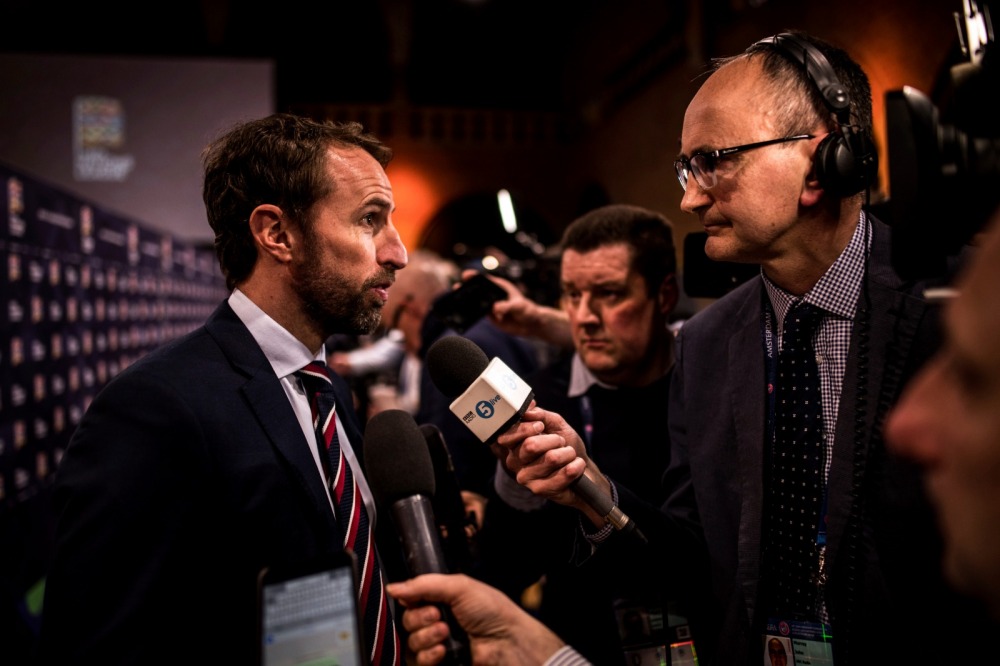
In so many ways, life, and especially sport, can be at its best when it is at its simplest, and that’s how John breaks the game down – with the very basics of what people want to hear and why they are tuning in. ‘The basic details, the score, where the game is in sense of time and an overview of what’s happening, that’s vital,’ he says. ‘On national radio you may be talking to listeners who have a passing interest, whereas with local radio you’re more often talking to the clubs’ supporters so you need a different approach and mindset. Whatever you’re doing, the language is always important as you try to draw people in. That’s why the summariser who you work with is so important.’ He regrets that the good old days of having two commentators, doing half the half each, and one summariser, are no longer, yet even so, having a conversation with the summariser explaining the action helps to keep the interest. ‘The relationship between you and the summariser is absolutely crucial. The best ones are the ones that are committed to doing a great job,’ John explains. ‘You also get to know them quite well; you travel with them and that helps too. I’ve worked with Chris Waddle for decades, and the brilliant Jimmy Armfield for 20 years, and you get very different things from, say, Chris Sutton or Robbie Savage, which I like because it keeps you on your toes. The best are the good story tellers but who have the credentials too, such as [the late] Graham Taylor,’ he continues. ‘Ex-players often see things long before you do, and they will often bring that extra bit of credibility to the broadcast.’
With the Euros upon us now now I’m keen to know what John’s thoughts for the England class of 2021 are. ‘Foden is really exciting and losing him would be a big loss. Mason Mount is another terrific prospect. I looked at the French squad and they seem very strong, but England’s 26 also has some real depth, giving really strong, quality options. There’s stiff opposition from others too; Germany, Belgium and Portugal, most of the usual suspects really. I’m also a little concerned there are three of four English teams in the major European cup finals.’ He goes on to say, ‘There are absolutely no guarantees in this, and with the group that England and Scotland are in [with Croatia and the Czech Republic] there are potential banana skins there, and after those finals, if England are not on it, you never know… but with three qualifying [from the group] it should be okay. What’s more, England have a quality squad and by the law of averages they will win something again.’ Let’s hope that doesn’t add the commentator’s curse, ahead of time.
Given that John Murray will also be interviewing England supremo Gareth Southgate, win, lose or draw – I wonder how he finds him. ‘He’s extremely fair,’ he says. ‘He also understands what it’s like on this side of the microphone having worked for BBC Radio Sport. What’s more, there have been some tricky issues since he’s been in the job, and he always seems to find the right answer – he’s very rarely wrong footed. But having said that, what he will really be judged by is how well the team play and whether he wins anything.’
Results will always be the main driver in professional sport and John’s take on some of the other managers is fascinating. ‘Pep Guardiola can be quite a tricky customer, in as much as the tricky ones are the ones that you never quite know how they’re going to be. With Guardiola, City can have a bad night and he will be forthcoming and talkative, and they can win comfortably and he’s more difficult. Jose Mourinho was always very good; people perceive him as prickly, but he would always answer your questions. Jürgen Klopp at Liverpool is brilliant to deal with.’
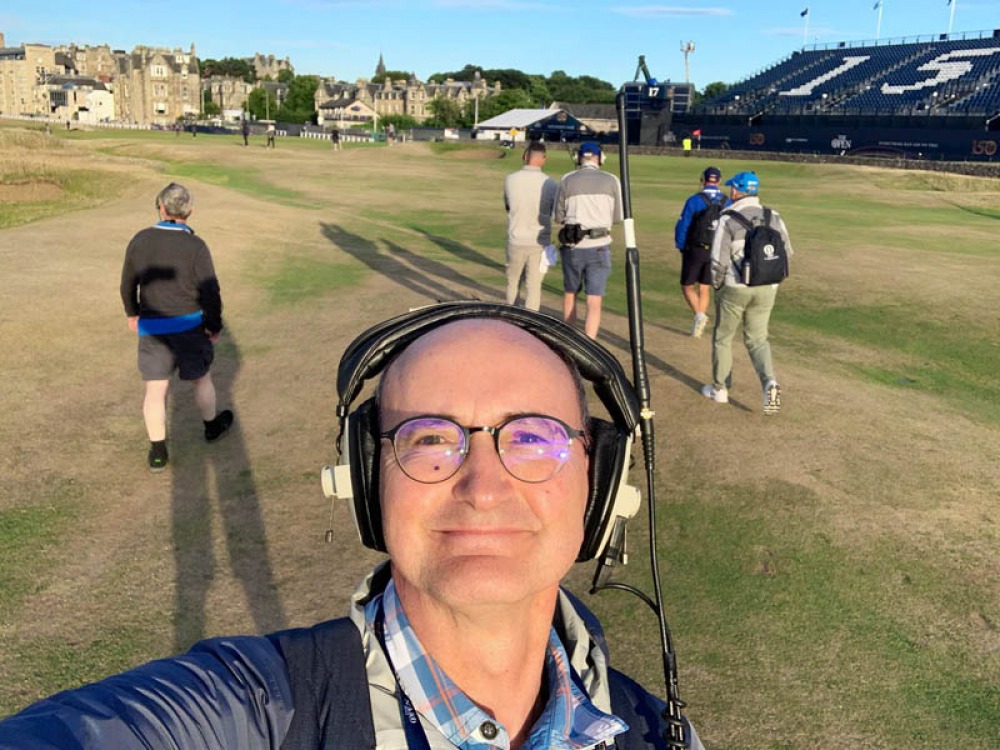
Managers can bring success but there are of course other variables, and I’m wondering why the North East and Yorkshire, despite some excellent football from Leeds in recent times, haven’t quite cut it. Murray is clear: ‘I cannot believe the talent is not there, because it’s such a sports-mad part of the world. Do the clubs really make the most of the talent that is there on their doorstep? There’s competition from around the world, but often I’m left thinking, could a local player have been given a greater opportunity?’
John Murray is one of those people who you could chat to tirelessly, covering all manner of subjects. As we draw to a close the obvious question simply has to be asked: what would be the one commentary he would most like to do if he could? His answer is immediate and unequivocal. ‘That would be the last Ashes Test at Lord’s, which would be won dramatically by England in the final over. For me, as sporting venues go, Lord’s is first, second and third in the pecking order!’ says John.
Looking back into history, I give him the choice of what to commentate on. ‘The obvious choice is the 1966 World Cup Final. Kenneth Wolstenholme does what good commentators do, he says what he sees: “There’s some people on the pitch... they think it’s all over… it is now!” As a commentator you would have to be happy with that.’
Other fond memories are reserved for the Ryder Cup when Bernhard Langer missed a six-foot putt at Kiawah Island, and when Graham McDowell won for Europe at Celtic Manor. ‘I had been immersed into the crowd and you could sense the history – and as a commentator that’s really exactly where you want to be.’ From some of the great occasions and venues we return to a more measured world and reflect on what was a huge sporting weekend for football: the FA Cup third round, which took place in early January. ‘I’ve managed my life recently by not looking too far ahead,’ John explains. ‘But when things were really grim in early January, it was the FA Cup third round and I remember leaving Harrogate and really looking forward to the weekend with two good matches to cover. I turned the radio on and the warnings were strict: do not leave home unless absolutely necessary, and there I was off to commentate on the FA Cup. Firstly I thought how lucky I was, and then I also hoped that I could play a small role in lifting the morale of the country. And while of course I’m biased, I do think radio has provided a really good service over this dreadful time, and for many, some essential company too.’
As he talks, I reflect back on the mess the BBC finds itself in today, and think how often I have listened to the radio and been informed, distracted and entertained. There may be problems, but the dedication of people like John Murray is to be roundly applauded.
Living in North Yorkshire allows John good access to much of the country for his work as well as somewhere beautiful to unwind. ‘I’ve lived in various places in North Yorkshire and it takes some beating as a place to be,’ he says. ‘I love the North York Moors and I spend a lot of time in the Dales too, it’s just a great part of the world in which to live. I have a real wish to be back in Northumberland near to the family.’ I guess that will have to wait for now.
As we reflect further on the summer of sport that lies ahead, comparing notes on likely winners, we reflect also on some of the great voices of the BBC, Peter O’Sullevan and Peter Alliss are mentioned, as well as some of the true greats of football. Today John Murray has that role, and while he is incredibly humble about what he has achieved I think about those isolated acres near Hadrian’s Wall and realise that if, like John, you believe, then you can get to the top and make your dreams come true. Who knows, maybe this summer England may come good in the Euros, and if they do John Murray will be the first to let you know.




